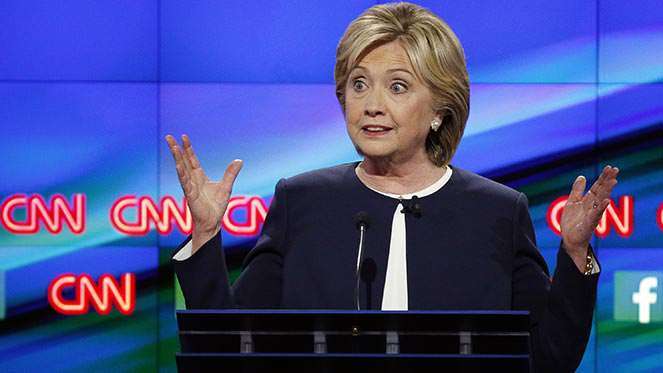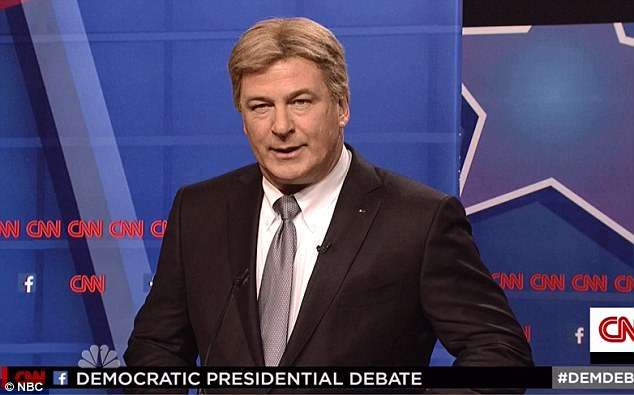Hillary Knows Something Most Democrats Can't Admit
Debate performance illustrates that civil liberties and executive-power abuse matter mostly when Republicans run the White House

Hillary Clinton is nothing if not responsive to the changing winds of Democratic Party opinion. As CNN's Anderson Cooper succinctly put it to her in the very first question of last week's Democratic presidential debate, "You were against same-sex marriage. Now you're for it. You defended President Obama's immigration policies. Now you say they're too harsh. You supported his trade deal dozen of times. You even called it the 'gold standard.' Now, suddenly, last week, you're against it." (It's worth noting that she promptly lied about the latter flip-flop.)
On guns, on responding rhetorically to the phrase "black lives matter," and especially on economic policy, Clinton is responding to the contemporary passions of the Democratic grassroots by tacking leftward. So it's illustrative for both the candidate and the party to observe which issues the Democratic frontrunner does not feel evident pressure to "absorb new information" about.
Chief among them is a critique that dominated lefty discourse in 2007-08, and then almost immediately vanished as a hot topic: the imperial presidency. Democrats in the late Bush/Cheney era were apoplectic about the White House's rogue warmaking; now their standard-bearer is characterizing as "smart power at its best" that time when the Obama administration acted in persistent, blatant defiance of Congress by bombing Muammar Gadhafi out of power:
Well, let's remember what was going on. We had a murderous dictator, Gadhafi, who had American blood on his hands, as I'm sure you remember, threatening to massacre large numbers of the Libyan people. We had our closest allies in Europe burning up the phone lines begging us to help them try to prevent what they saw as a mass genocide, in their words. And we had the Arabs standing by our side saying, "We want you to help us deal with Gadhafi."
Our response, which I think was smart power at its best, is that the United States will not lead this; we will provide essential, unique capabilities that we have, but the Europeans and the Arabs had to be first over the line. We did not put one single American soldier on the ground in Libya. […]
I think President Obama made the right decision at the time. And the Libyan people had a free election the first time since 1951. And you know what, they voted for moderates, they voted with the hope of democracy. Because of the Arab Spring, because of a lot of other things, there was turmoil to be followed.
But unless you believe the United States should not send diplomats to any place that is dangerous, which I do not, then when we send them forth, there is always the potential for danger and risk.

This plate of hot rhetorical garbage was quickly disposed of by Jim Webb, whose lack of purchase in the Democratic race—despite his long record of opposing the imperial presidency—is another indication of how this issue just doesn't have juice in 2015. Webb's economical response:
We had no treaties at risk. We had no Americans at risk. There was no threat of attack or imminent attack.
There is plenty of time for a president to come to the Congress and request authority to use military force in that situation. I called for it on the Senate floor again and again. I called for it in Senate hearings.
It is not a wise thing to do. And if people think it was a wise thing to do, try to get to the Tripoli airport today. You can't do it.
Clinton's equally cavalier (and inaccurate) treatment of Edward Snowden ("He could have been a whistleblower, he could have gotten all the protections of being a whistleblower"), and defense of her vote to support the Patriot Act ("I think that it was necessary to make sure that we were able after 9/11 to put in place the security that we needed….We always have to keep the balance of civil liberties, privacy and security") make the case plain: If there remains any anti-war, pro-civil liberties sentiment among Democratic voters, it is not being reflected in their choice for president.
Even more telling, that frontrunner is not feeling any observable political pressure to even feint toward a civil-libertarian direction. Which is an indictment not just of Hillary Clinton, but of the partisan opportunism underlying too much left-of-center activism. If Obama's grotesque flip-flops on executive power and war-making didn't cost him the love of his base, after all, why should Clinton even pretend to care in the first place?
Related:
* Admit it, Dems: Hillary Could Strangle a Puppy on Live TV, and You'd Still Back Her
* Is GOP Foreign Policy Getting More Libertarian, or Is it Just Anti-Democrat Opportunism?


Show Comments (220)